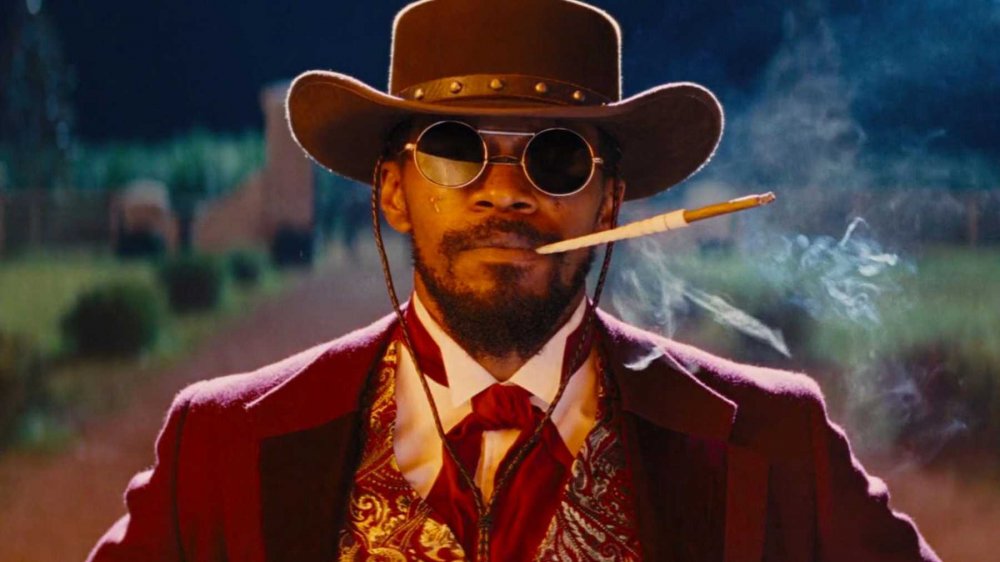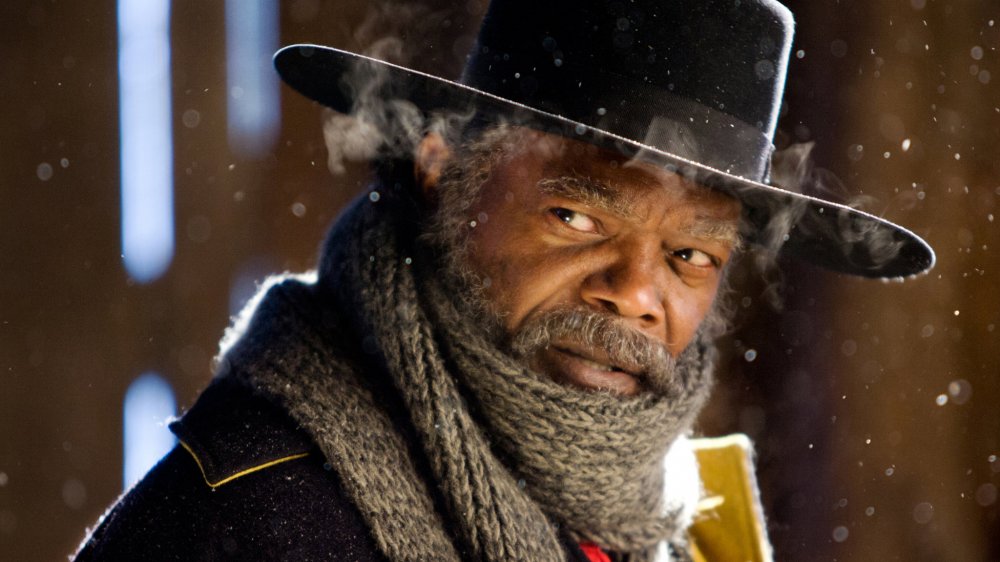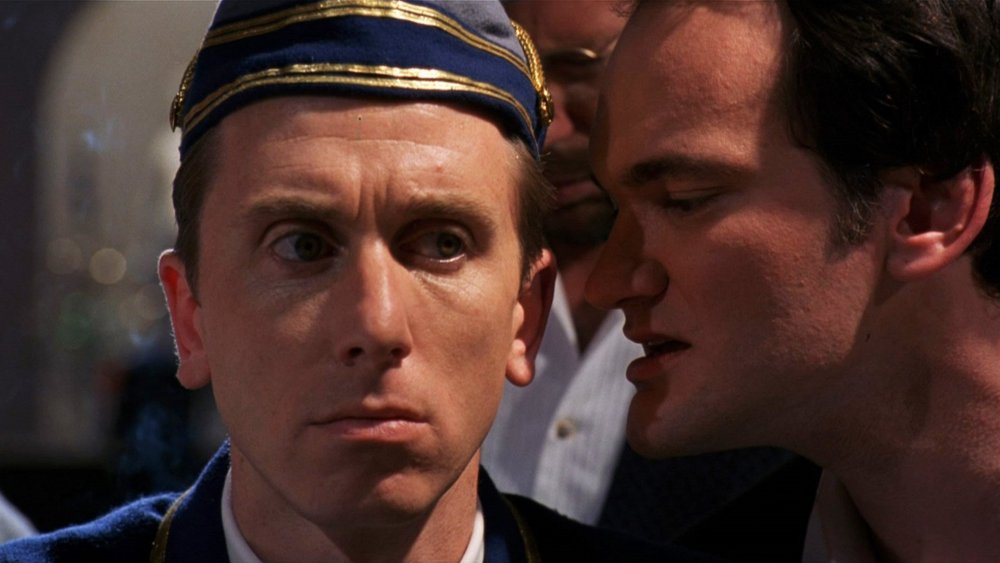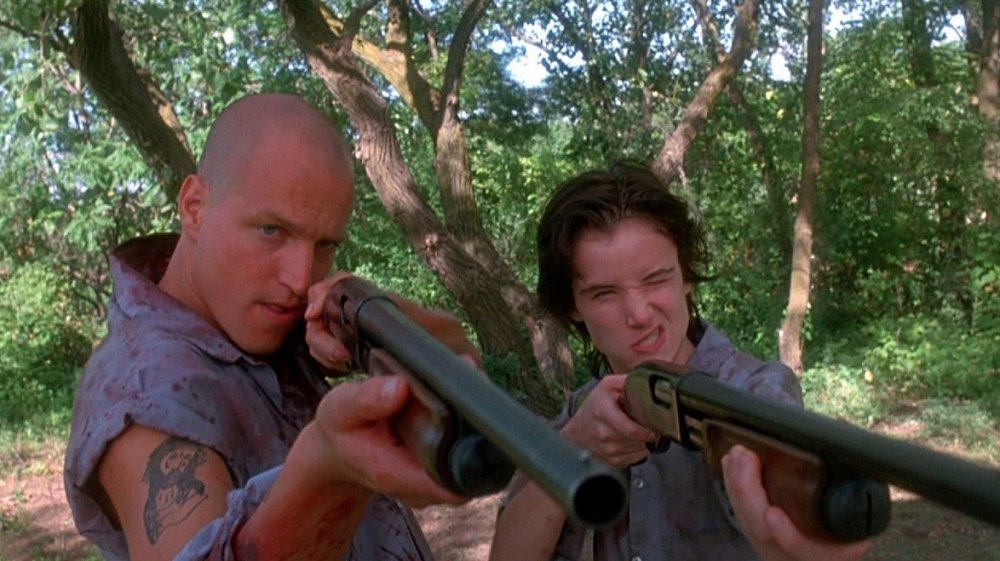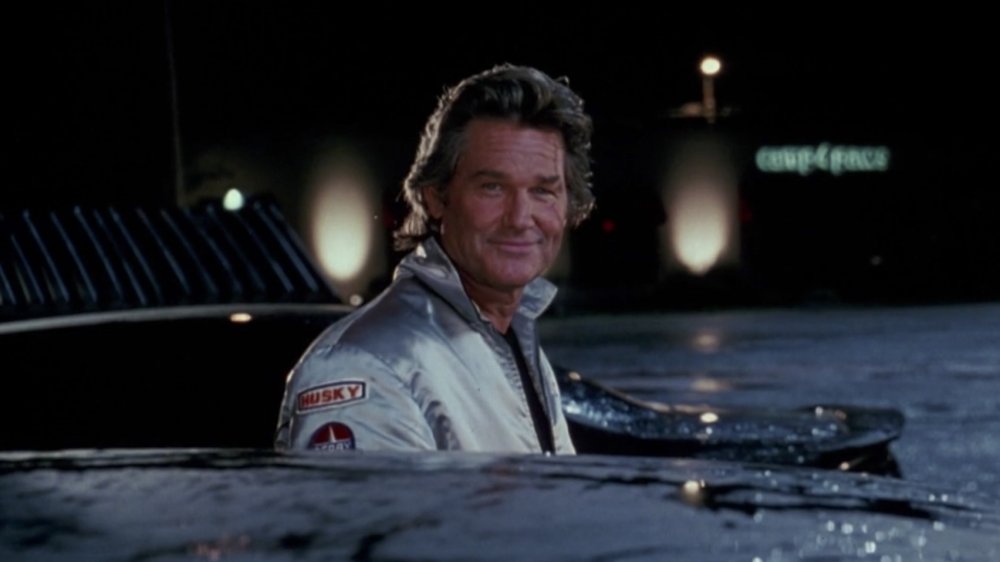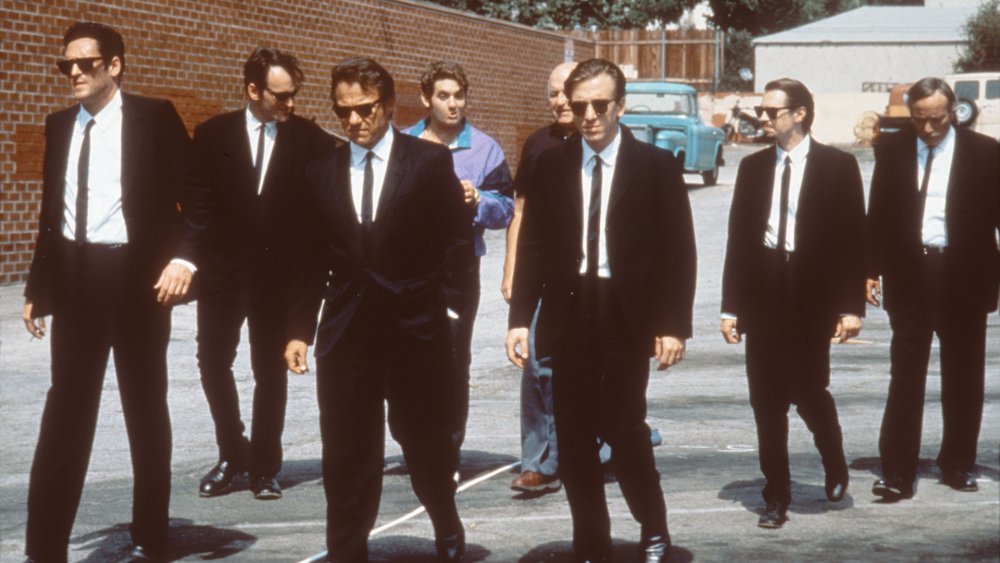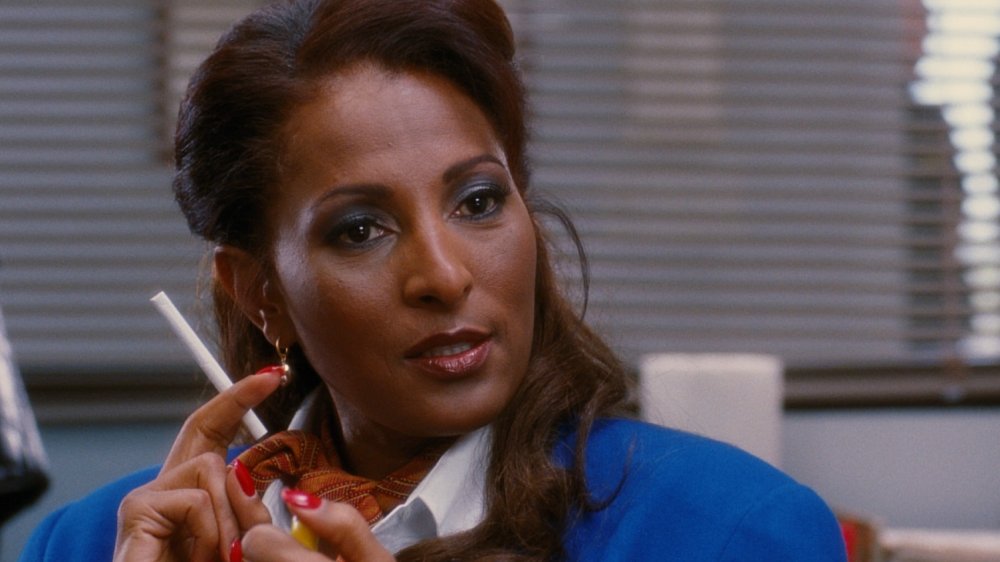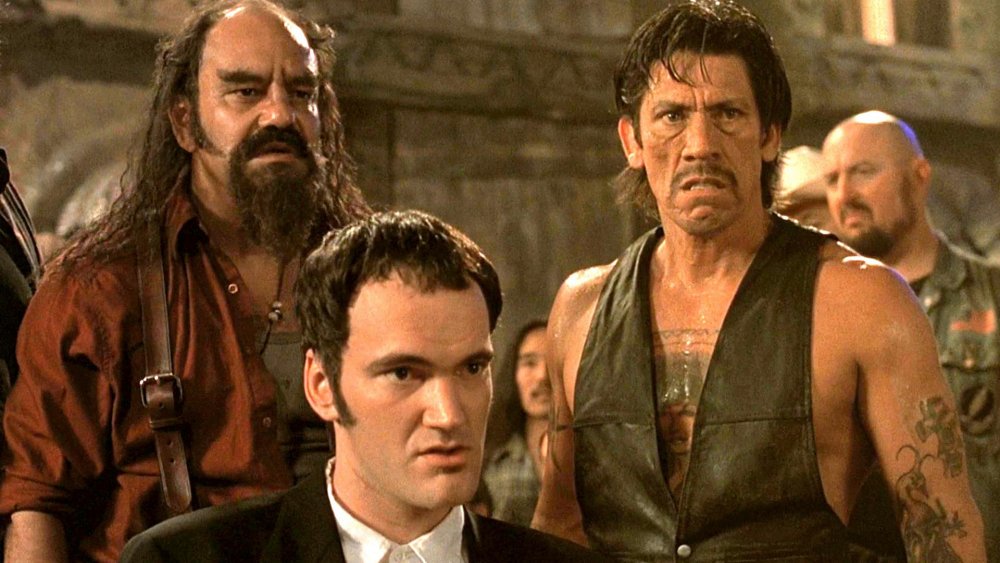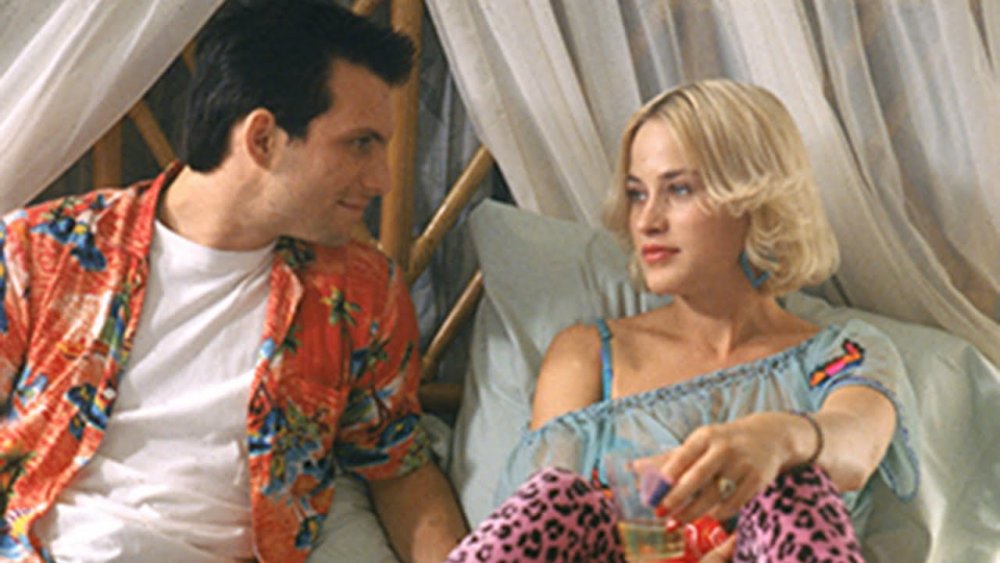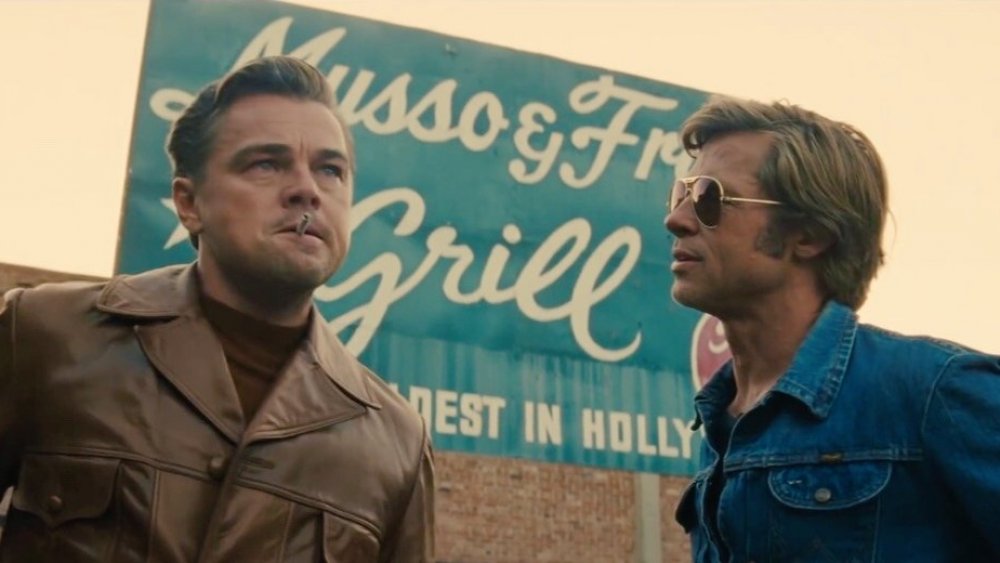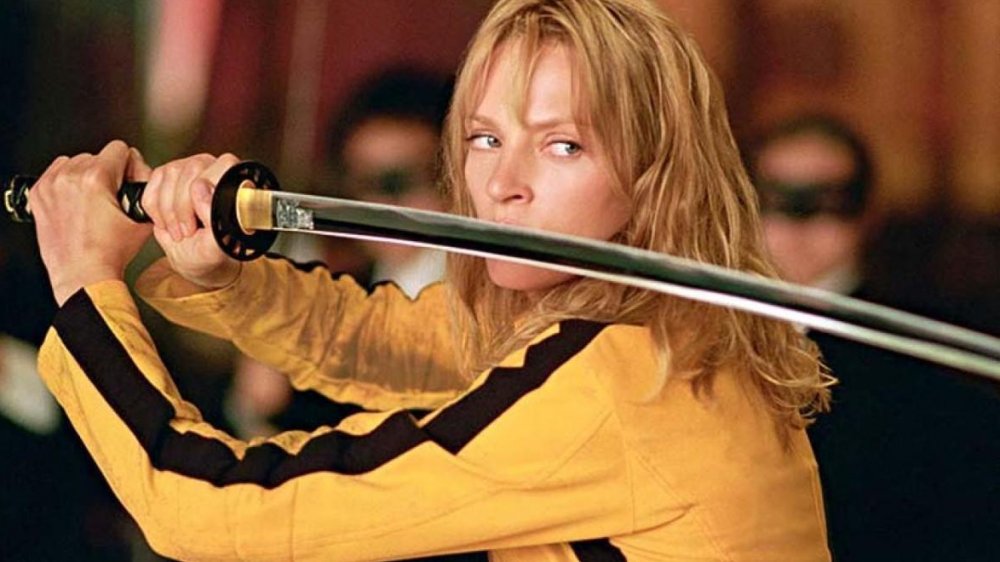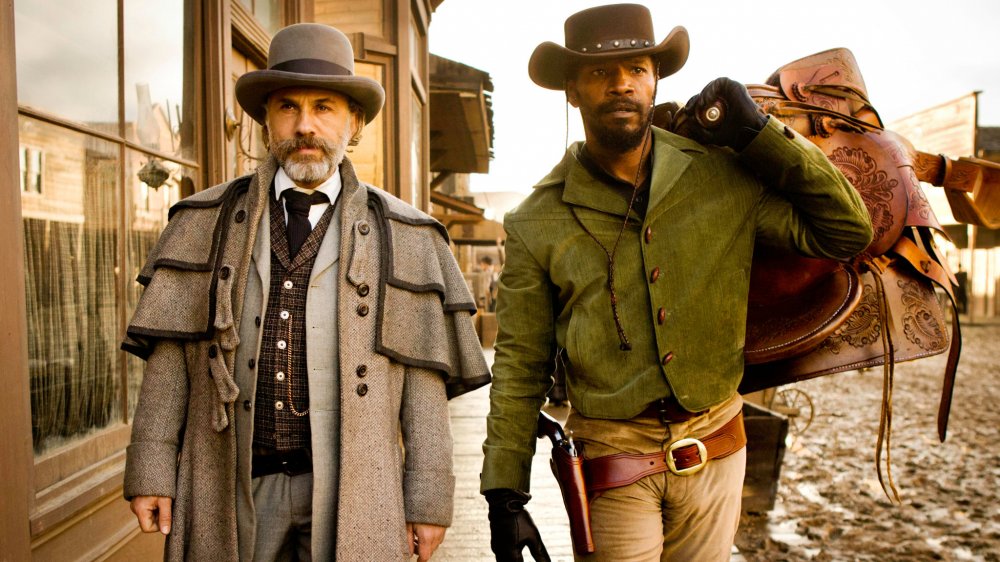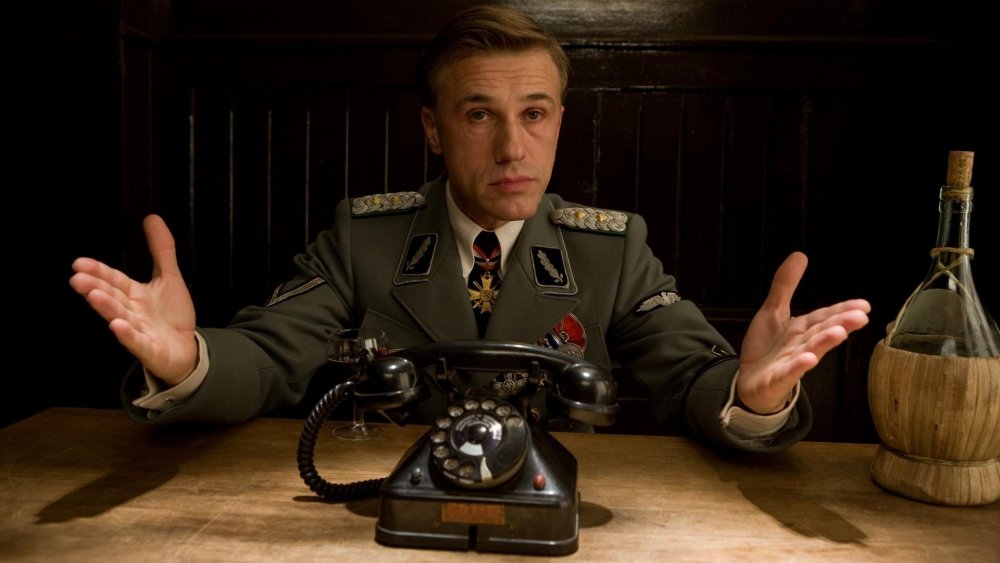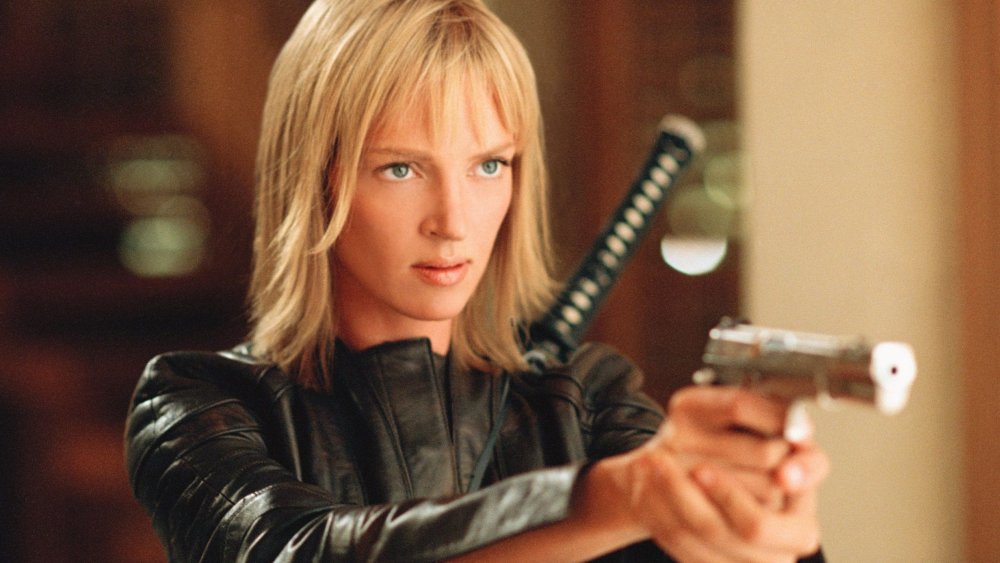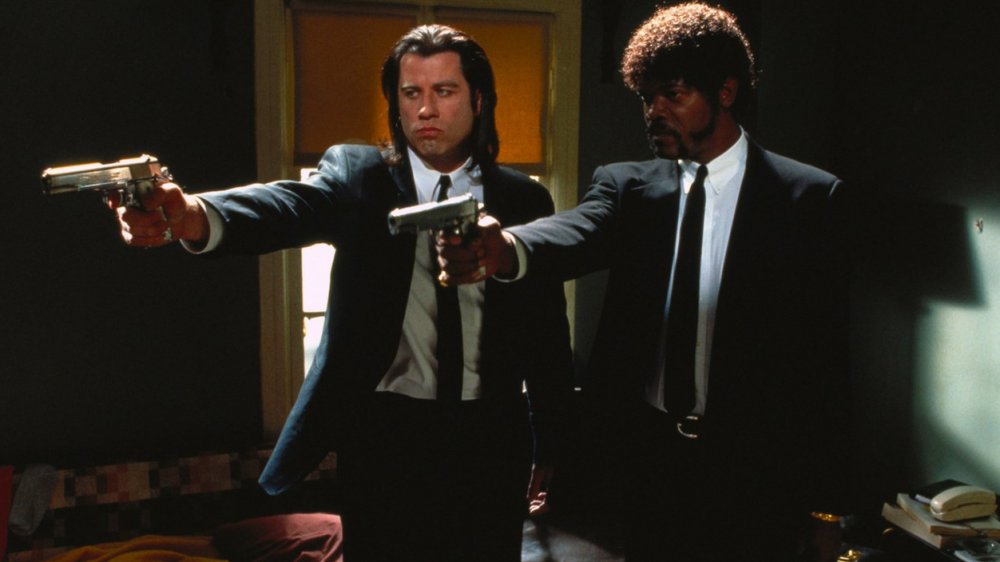Every Quentin Tarantino Film Ranked From Worst To Best
From working at a video store in California to becoming one of the most commercially and critically successful directors in the history of independent films, Quentin Tarantino has left a pretty incredible mark on pop culture. But with eight films under his belt—plus a couple more that he wrote but didn't direct—we're left wondering which ones are really that good.
So sharpen up your Hattori Hanzo sword and pop open that mysterious briefcase as we take a trip through his filmography to figure out which one reigns supreme. And don't worry: we're limiting ourselves to only one foot fetish joke, and this is it.
14. The Hateful Eight (2015)
"The Hateful Eight" should be amazing.
It has an incredible cast that reunites Tarantino with some of the all-stars he'd worked with previously (including Kurt Russel, Tim Roth, Zoe Bell, and, of course, Samuel L. Jackson) while also throwing newcomers like Channing Tatum into the mix for good measure. On top of that, it was the follow-up to "Django Unchained," where Tarantino proved that he was more than capable of making an entertaining Western, but built around the intriguing twist of bottling up its action in what was essentially a single room. The stage was set for an incredibly tense thriller that would inevitably build to Tarantino's signature brutal violence, complete with a third-act twist that blew the locked-room mystery element wide open and changed everything.
In practice, however, "The Hateful Eight" was monumentally disappointing. Despite featuring some of the most charismatic actors in the business, the paper-thin characters outlived their welcome far before the movie stumbled to the end of its three-hour runtime. The tension that's baked into the story just by virtue of bottling up a bunch of suspicious characters wound up collapsing under its own weight and evaporating, turning "The Hateful Eight" into a thriller that just didn't have any thrills. The only thing it actually delivered on was the promise of a truly bloody climax, but at the end of the day, that's something that literally every other Tarantino film does better, without taking its sweet time to get there.
13. Four Rooms (1995)
If you ever want to learn everything you need to know about independent filmmaking in the '90s but you only have two hours to do it, watch 1995's "Four Rooms." It's a bizarre little artifact of the era, an anthology involving four up-and-coming directors, with each segment set in a different room of the same hotel, all united by a single character: Ted the Bellhop, a hapless, high strung bellhop played by '90s indie mainstay Tim Roth.
Tarantino was (and remains) the biggest filmmaker involved, having just come off the massive mainstream success of "Pulp Fiction," and as a result, he got the prime spot as the writer and director of the movie's final segment, "The Man From Hollywood." It's not bad, either, with Tarantino loosely adapting Roald Dahl's "The Man From the South" — once used as one of the better episodes of "Alfred Hitchcock Presents" — as a fast-talking farce that skips out on the chills of the original in favor of a snappy punchline about Ted making the most of his increasingly surreal evening.
The problem is that it's not great, either. It's perfectly fine, but it plays up Tarantino's tendency toward references and homages and winds up feeling pretty slight, especially when it's compared to the segment that immediately precedes it: Robert Rodriguez's "The Misbehavers." That one winds up being the true standout, marking the first time that Tarantino would wind up being overshadowed in a collaboration with Rodriguez, but certainly not the last.
12. Natural Born Killers (1994)
"Natural Born Killers" is really only a Tarantino film on a technicality. He wrote the original screenplay, but by the time Oliver Stone finished directing his version of the hyperviolent satire of mass media and mass murder, so much had been changed that Tarantino only received a story credit, and once referred to it as being "not even remotely" one of his own movies.
The original screenplay, written alongside "Reservoir Dogs" and "True Romance" while Tarantino was working at a video store, was far more straightforward than what made it to film, which is initially what attracted Stone to the project. At the end of the day, Stone, along with his producers and rewriter David Veloz, found themselves far more interested in the way that media sensationalized murder and violence in real-life stories like the OJ Simpson murder trial and the siege of the Branch Davidian compound in Waco, and rebuilt the movie as a satire that dealt with those themes. Tarantino's love of wild, over-the-top violence made it through to the final version of the film, and much of the dialogue remained unchanged, but thematically, it's a completely different beast.
The end result is a film that's well-made and extremely compelling, but that's also not really a "Quentin Tarantino movie" in any way that really matters.
11. Death Proof (2007)
Let's start with the obvious: for a movie that's nominally about fast cars crashing into each other at high speeds, "Death Proof" is an extremely slow movie. There are seemingly endless, fairly pointless conversations that pad out the movie between the two big car chases, and make a film that comes in at just under two hours feel like it drags its feet for a whole lot longer. On top of that, it might be Tarantino's most purely referential work on virtually every level, from the explicit callbacks to 1971's "Vanishing Point" all the way down to the techniques Tarantino used to make his new movie seem old. Considering it's up for that title against "Kill Bill" and "Jackie Brown," that's saying something.
But that's the big trick to "Death Proof." For a movie released in 2007, it seems to bounce back and forth between ponderous narrative and lurid high concept, but for good or ill, that's all on purpose. When Tarantino and Robert Rodriguez set out to pay tribute to the grindhouse double features of the '70s, Tarantino's half was a note-perfect recreation of those movies, warts and all. It's not just talky and violent, it's talky and slow in the same way that, say, "Two Lane Blacktop" and "Vanishing Point" were talky and slow. And that twist ending, where the horror movie suddenly becomes a hilarious slapstick revenge movie? That's pure Tarantino having a ton of fun.
Unfortunately for "Death Proof," Rodriguez's half of "Grindhouse" wasn't quite the throwback that Tarantino's was. "Planet Terror" moves fast, goes way over the top with its ludicrous zombie violence, and features some of Rodriguez's funniest comedy moments to boot. On its own, "Death Proof" has a lot going for it, but in its original double-feature release, "Planet Terror" just makes it seem slower, smaller, and a lot less fun.
10. Reservoir Dogs (1992)
"Reservoir Dogs" isn't just a phenomenal directorial debut — although it certainly is that — it's also the prototype for virtually everything that Quentin Tarantino would be doing for the next 25 years. It's all here, from the blood-soaked violence to the nonlinear storytelling that would become his trademark in "Pulp Fiction" and "Kill Bill," to the characters having hyper-obsessive conversations about pop culture shortly before getting into incredibly deadly situations. It's even got Tim Roth and Michael Madsen, who would go on to be two of Tarantino's go-to casting choices. And that soundtrack? Madsen grooving to '70s classics while slicing off a man's ear is still one of the most iconic moments of Tarantino's career.
That said, prototypes, even great ones, are still meant to be improved upon. "Reservoir Dogs" laid down the foundation and made Tarantino an instant favorite for critics and audiences alike — to the point where it was hailed as "the greatest independent film ever made" — but later films would find Tarantino refining his approach and building on what he'd already done.
9. Jackie Brown (1997)
"Jackie Brown" is unquestionably Tarantino's most underrated film, and to be honest, it's pretty easy to see why. For one thing, it was his first feature after the massive breakthrough success of "Pulp Fiction" made him a pop culture icon, and inevitable backlash would've affected anything he made next.
Beyond that, it's so markedly different from his other films that it can't help but seem like the one that doesn't quite fit. Sure, it's got plenty of the same kind of references to '70s music and cinema that you see in his other films — including casting the legendary Pam Grier in the title role and setting the title in the same typeface as Grier's blaxploitation classic, "Foxy Brown" — but beyond that, there's very little linking it to his other movies. There's no over-the-top excessive violence, the story's told completely in order, and, perhaps most unusual for Tarantino, it stands as the only time that he's adapted a novel, Elmore Leonard's "Rum Punch," for the screen.
But that's also what's great about it. With "Jackie Brown," Tarantino showed that he could tell a slightly more focused, smaller crime story that didn't necessarily have to sprawl out into a nonlinear epic. As much as it might not seem like it goes with the others, there's a good reason that it's Leonard's favorite adaptation of his own work.
8. From Dusk Till Dawn (1996)
We've already covered two other instances of collaborations with Robert Rodriguez not exactly working out in QT's favor, but don't get the impression that's always the case. Sometimes, those two dudes are the chocolate and peanut butter of hyper-violent, blood-soaked action movies: the two great tastes that taste great together. And nowhere is that better illustrated than in "From Dusk Till Dawn."
Directed by Rodriguez with a script by Tarantino, who also stars alongside George Clooney and Juliette Lewis as the intensely creepy Richie Gecko, it follows a pair of bank robbers who hijack a faithless pastor and his family in an effort to get across the border to Mexico, and wind up at a strip club staffed entirely by vampires. As you might've guessed from that setup, it's ridiculously over the top, even by Tarantino/Rodriguez standards. This is, after all, a movie where the major villain is a blood-sucking exotic dancer named Santanico Pandemonium (Salma Hayek), and where one of the good guys is a biker named Sex Machine (zombie movie icon Tom Savini) who fends off vampires with a crotch-gun that he fires via deadly pelvic thrusts.
In other words, it's fun. Even better, it manages to showcase some of the best of what both filmmakers had to offer, with Rodriguez's spectacular visual sensibilities taking center stage alongside Tarantino's compelling characters and memorable dialogue.
7. True Romance (1993)
If "Natural Born Killers" was Oliver Stone starting with a Quentin Tarantino idea and going in a completely different direction with it, "True Romance" was Tony Scott providing audiences with an almost unfiltered version.
The key word there is "almost," but still. Even though he didn't direct it, this couldn't feel more like an early Tarantino film, with all the signature moves that you'd expect to see. There's the way that the story follows two hapless, lovestruck criminals as they wind up involved in a crime that goes way over their heads — a theme that you'd see a lot in Tarantino's earliest scripts, whether it was Mickey and Mallory in "Natural Born Killers" or Pumpkin and Honey Bunny in "Pulp Fiction" — and a cast of engaging supporting characters who feel like they could have an entire movie all to themselves. It's even got a truly brutal climactic fight scene between Patricia Arquette and James Gandolfini that feels like the prototype for what you'd see later in "Kill Bill." And just in case all that wasn't Tarantino enough for you, there's also a scene where the two main characters talk about how great Sonny Chiba is. It doesn't get much more QT than that.
The only things that really wedge that "almost" in there are that the original script was more nonlinear, and ended with Clarence dying rather than getting a happily-ever-after ending alongside Alabama. Tarantino initially balked at the decision and considered removing his name from the final film, but Scott's offer to shoot both endings and see which worked best convinced him to go along with it, and even Tarantino had to admit that it worked.
6. Once Upon a Time In Hollywood (2019)
Looking at it on paper, "Once Upon a Time in Hollywood" seemed like a pretty dicey proposition from pretty much every angle. It had a great cast, but it was following up "The Hateful Eight," which proved that a great cast could only carry a meandering, ultra-violent script so far. It was a movie about movies, and while you could say that about every Tarantino flick on some level, this one stripped away the layer of being inspired by '60s cinema and just went fully literal with it. The Manson Family murders had also seen a resurgence in the public consciousness thanks to the rise of a new generation of true crime fandom fueled by podcasts, but tackling a well-known, horrifying, and relatively recent tragedy as an action-comedy with Tarantino's tendency towards historical revisionism seemed like a surefire way to make everyone mad — and if that didn't do it, the Bruce Lee fight would.
But if Tarantino's work has shown us anything, it's that you can't really predict what it's going to be like when it hits the screen. And it turned out that asking what would've happened if Hal Needham, the stuntman turned director of "Smokey and the Bandit" and "The Cannonball Run," teamed up with his longtime collaborator, Burt Reynolds, and fought the Manson Family with a flamethrower — a question none of us had ever thought to ask — made for a wildly entertaining film.
The second time around, the big shift in history didn't quite come as the surprise that it did in "Inglourious Basterds," but it was the same kind of bizarre feel-good moment. And sure, it wasn't quite groundbreaking in the way that Tarantino's better films were, but the sharp, unpredictable story and the truly stellar cast — with Margot Robbie giving a typical standout performance — made this a solid outing.
5. Kill Bill: Vol. 1 (2003)
To say that Tarantino has always worn his cinematic influences on his sleeve is understating things quite a bit, but that's never been more apparent than in the first volume of "Kill Bill."
Originally filmed as a single movie that wound up running a little over four hours and got chopped up into two parts for its theatrical release, "Kill Bill" is a synthesis of everything that Tarantino loves about Hong Kong wuxia films, revenge epics like "Point Blank," and Sonny Chiba's "Street Fighter" saga, to the point of actually casting Chiba himself in a major role as Hattori Hanzo.
What's really amazing, though, is how well this first part stands on its own without feeling like the first chapter of a single movie. It has some of Tarantino's best sequences, including the delightfully brutal showdown against O-Ren Ishii and the Crazy 88 at the House of Blue Leaves — not just a showcase for Tarantino, Uma Thurman, and Lucy Liu, but for stuntwoman Zoe Bell and Hong Kong legend Gordon Liu as well — and Kazuto Nakazawa's beautifully directed anime origin for O-Ren. With touches like that, it goes well beyond just an homage and becomes something far better than the sum of its parts.
4. Django Unchained (2012)
There's a pretty compelling argument to be made that "Django Unchained" is Quentin Tarantino's best movie.
It certainly has some of the best performances, including Leonardo DiCaprio's turn as the truly despicable Calvin Candie — a performance that was so intense that DiCaprio legitimately shattered a wine glass, cutting his hand badly enough to require stitches, and finished the scene without ever breaking character. The amazing thing, though, is that "Django" ends up balancing every aspect of a story that, in lesser hands, would feel disjointed and full of tonal whiplash.
It's a comedy where the gags, like Don Johnson as the idiot leader of an equally stupid gang of Klansmen who get blown up with dynamite, are genuinely funny, largely thanks to Jamie Foxx's endlessly charming performance in the lead role. It's a revenge movie where the bad guys are infinitely easy to hate, where you want to see them dead almost as much as you want Django and Broomhilda to find each other again. It's a story of love and friendship conquering all where the romance is genuinely stirring, and where Christoph Waltz is able to earn some sympathy by playing the exact opposite of his character in "Inglourious Basterds."
3. Inglourious Basterds (2009)
The opening scene of "Inglourious Basterds," where Christoph Waltz's charming, horrifying Nazi investigator sits across the table from a farmer offering up a torturously slow revelation and an impossible choice is one of the most tense, thrilling, and horrifying scenes of the past few decades, but it's not the best thing about the movie. The scenes where Brad Pitt as the leader of the Basterds demands a hundred Nazi scalps from each of his soldiers, and where the Bear Jew crushes a German soldier's head with a baseball bat have visceral grindhouse thrills, but they're not the best thing either. The slow burn reveal with Daniel Bruhl as a decorated sniper that reveals that even a polite Nazi is still a Nazi is a brutal punch to the gut, but ... well, you get the idea.
No, the best thing about "Basterds" is that it's a World War II movie that manages to subvert the one incontrovertible truth about World War II movies: we know how they end. In this movie, though, it's not a self-inflicted gunshot in a bunker that takes out Hitler, it's a handful of Jewish soldiers unloading machine guns in a burning movie theater in one hell of a great ending.
2. Kill Bill: Vol. 2 (2004)
Everything that we already said about "Kill Bill: Vol. 1" still applies to the sequel — they were filmed as a single movie, after all, so it makes a lot of sense that they'd both have the same things going for them — but there's one thing that puts the second volume ahead of the first: an emotional core that underscores the action.
If the first movie's focus is on the horrific suffering that leads the Bride on her "roaring rampage of revenge," the second is about how she chooses to overcome it, literally and figuratively digging herself out of the grave that Bill put her into. And when she actually confronts Bill, their conversation — and his crucial, completely appropriate misunderstanding of how Superman works — gives the characters far more depth than any blood-soaked step-by-step revenge movie could. Not that "Kill Bill: Vol. 2" is lacking in blood, you understand.
Plus, Gordon Liu as Pai Mei might just be the most iconic Tarantino character ever. The eyebrows! The eyebrows!
1. Pulp Fiction (1994)
"Pulp Fiction" isn't just Tarantino's breakthrough hit, and it's not just the movie that defined his career. It was—and is—a pop culture phenomenon with an influence that's still being felt over two decades after its release.
On its own, it's the movie that made Samuel L. Jackson a household name, resurrected John Travolta's career, and proved that a complicated crime story with a mysterious McGuffin, told out of order, could be a massive mainstream success. Think about how many times you've heard the phrase "get medieval," or seen someone recreate Uma Thurman's Batusi moves on the dance floor, or heard Tarantino's version of Ezekiel 25:17 quoted in place of the actual, much shorter Bible verse. It's a movie that changed pop culture forever, and still holds up as a justified classic.
